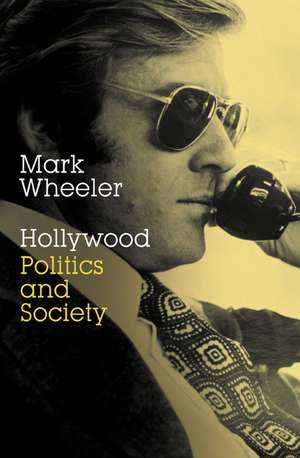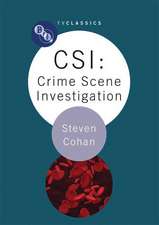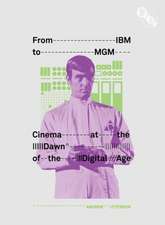Hollywood: Politics and Society
Autor M. Wheeleren Limba Engleză Paperback – 11 sep 2006
Preț: 235.83 lei
Nou
Puncte Express: 354
Preț estimativ în valută:
45.13€ • 46.76$ • 37.67£
45.13€ • 46.76$ • 37.67£
Carte disponibilă
Livrare economică 28 februarie-14 martie
Preluare comenzi: 021 569.72.76
Specificații
ISBN-13: 9781844571369
ISBN-10: 184457136X
Pagini: 188
Dimensiuni: 155 x 235 x 19 mm
Greutate: 0.59 kg
Ediția:2006
Editura: British Film Institute
Colecția British Film Institute
Locul publicării:London, United Kingdom
ISBN-10: 184457136X
Pagini: 188
Dimensiuni: 155 x 235 x 19 mm
Greutate: 0.59 kg
Ediția:2006
Editura: British Film Institute
Colecția British Film Institute
Locul publicării:London, United Kingdom
Descriere
Provides
a
political
history
of
Hollywood
and
a
reflection
on
the
relationship
between
cinema
and
politics
in
America,
from
1900
to
the
present
day.
Wheeler
considers
the
interplay
between
studios
and
the
state,
the
political
constituencies
within
Hollywood
and
the
links
between
Hollywood
and
political
activism.
Notă biografică
Mark
Wheeler
is
Senior
Lecturer
in
the
Department
of
Law,
Governance
and
International
Relations
at
London
Metropolitan
University.
Textul de pe ultima copertă
At
the
beginning
of
the
21st
century,
the
US
film
industry
had
overtaken
aeronautics
and
car
industries
to
become
one
of
the
highest
exporters
of
American
products.
Mark
Wheeler's
important
new
book
provides
both
a
political
history
of
Hollywood
and
a
reflection
on
the
relationship
between
cinema
and
politics
in
America,
from
1900
to
the
present
day.
Wheeler
considers
the
interplay
between
the
movies
studios,
state
and
national
government
and
cultural
policy
and
legislation,
with
case
studies
of
the
censorship
that
followed
in
the
wake
of
the
Hays
Code
1930
and
the
investigations
of
the
House
Committee
of
Un-American
Activities
(HUAC)
in
the
1950s
that
led
to
the
notorious
blacklisting
of
alleged
or
known
Communist
sympathisers.
His
history
of
political
constituencies
within
Hollywood
ranges
from
the
conservative
right
to
the
liberal
and
the
communist
left,
from
trades
unionists
to
movie
moguls.
The
book
concludes
with
a
look
at
the
politics
of
show
business,
addressing
links
between
Hollywood
and
political
activism,
films
such
as
"The
Candidate"
and
"Bulworth"
that
have
themselves
engaged
with
the
political
process,
and
considering
the
irony
that
despite
the
fact
that
Hollywood
is
perceived
as
a
bastion
of
liberalism
the
two
most
famous
actors-turned-politicians
have
been
Ronald
Reagan
and
Arnold
Schwarzenegger.










